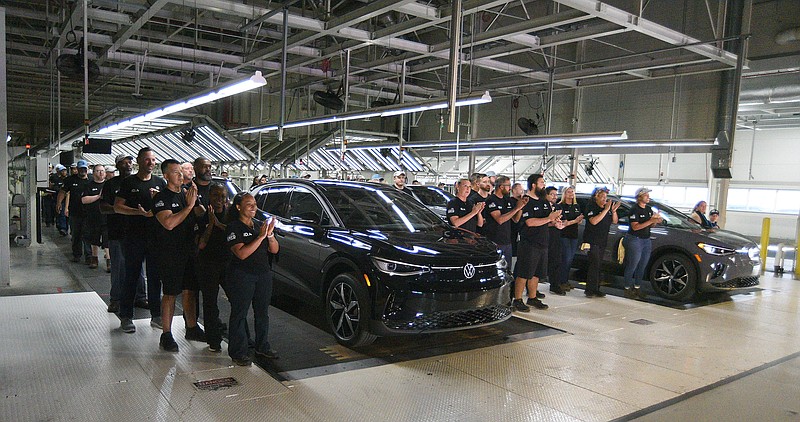Volkswagen said Friday that electric vehicle sales surged in 2022, putting the automaker on pace for EVs to make up half of all deliveries in 2030 as it reportedly weighs new North American assembly and battery plants.
Battery-electric vehicle sales climbed 26% globally this past year to 7% of all deliveries in the group as the company said it's on track for EVs to hit 20% of total deliveries in just two years.
The results were reported as Volkswagen's supervisory board met to discuss plans for two new factories in North America, one production plant and one battery cell factory, according to Reuters, citing two people familiar with the matter.
While the board was expected to approve a site for its Scout EV brand in the United States, discussions around a gigafactory are open-ended, Reuters said.
In Chattanooga, VW last year launched production of its ID.4 electric SUV, and the company has said it plans to produce about 90,000 of the EVs in 2023 in the plant alongside the automaker's conventionally powered Atlas vehicles.
Tennessee's top economic development official said earlier this week he's planning to go to Germany this month and he'll meet with VW officials while he's there.
"I know they are assessing their growth and looking at a lot of options, and we're here to help them as they move forward," said Stuart McWhorter, commissioner for the Tennessee Department of Economic and Community Development, during a visit to the Hamilton County Business Development Center.
Automakers and battery producers have made a wide array of EV investments in Tennessee and Georgia. Chattanooga is sitting amid more than $30 billion of new or planned investments in the two states alone.
Reuters has reported Volkswagen is looking at expanding its existing Chattanooga factory to produce the electric ID.Buzz, the successor of the once-popular Microbus. The automaker added that the Scout brand with its plan for electric SUVs and pickup trucks will require a new platform and the existing Tennessee plant does not have enough space to do it all.
But the VW assembly plant's sprawling Enterprise South industrial park location has lots of acreage to accommodate future manufacturing of vehicles or supply chains, officials have said.
Australia-based Novonix, which makes materials used in batteries, plans to invest about $160 million and employ 300 workers at its new Chattanooga facility in the former Alstom turbine-manufacturing plant on Riverfront Parkway.
But Novonix officials also are looking at building another plant and employ 1,000 more workers as they search for a greenfield site.
Joda Thongnopnua, Chattanooga Mayor Tim Kelly's chief of staff, said in October at the existing plant that "we're fighting hard for it."
Tom Taylor, a policy analyst for Washington, D.C.-based Atlas Public Policy, said in a phone interview Friday that the Southeast is known as "the battery belt" because of the clustering of investments in EVs and batteries.
"More than 40% of U.S. EV investment is in the Southeast," said the analyst for the data and research firm that studies the EV issue.
Taylor cited the location of several right-to-work states in the Southeast along with the region's labor force, incentives and subsidies to companies and electricity rates.
"Once you have a bit of a cluster ... other facilities appear to be quite intentional about locating in a similar region," he said.
Arno Antlitz, the Volkswagen Group's chief financial officer, said in a statement Friday that the company's solid financial results in 2022 came amid a challenging global backdrop.
"Despite significant supply chain challenges leading to a decline in overall delivery numbers, we delivered 572,100 all-electric vehicles and simultaneously further increased operating profits," he said.
Antlitz said the supply chain bottlenecks which hit the auto industry this past year are expected to gradually ease in 2023 and enable VW to service a high order backlog.
Looking ahead, deliveries of all VW vehicles are expected to rise, while sales revenues increase by between 10% and 15%. Operating return on sales was forecast in the range of 7.5% and 8.5%, according to VW.
Contact Mike Pare at mpare@timesfreepress.com or 423-757-6318.
